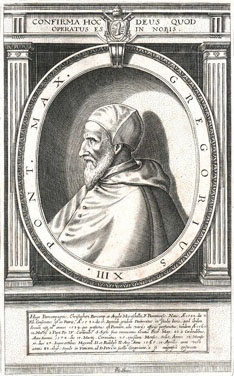| Pope Gregory XIII  AKA Ugo Buoncompagno AKA Ugo Buoncompagno
Born: 7-Jan-1502
Birthplace: Bologna, Italy
Died: 10-Apr-1585
Location of death: Rome, Italy
Cause of death: unspecified
Gender: Male
Religion: Roman Catholic
Race or Ethnicity: White
Occupation: Religion Nationality: Italy
Executive summary: Roman Catholic Pope, 1572-85 Gregory XIII, born Ugo Buoncompagno, Roman Catholic Pope from 1572 to 1585, was born on the 7th of January 1502, in Bologna, where he received his education, and subsequently taught, until called to Rome (1539) by Pope Paul III, who employed him in various offices. He bore a prominent part in the council of Trent, 1562-63. In 1564 he was made cardinal by Pope Pius IV, and, in the following year, sent to Spain as legate. On the 13th of May 1572 he was chosen pope to succeed Pope Pius V. His previous life had been rather worldly, and not wholly free from spot; but as pope he gave no occasion of offense. He submitted to the influence of the rigorists, and carried forward the war upon heresy, though not with the savage vehemence of his predecessor. However, he received the news of the massacre of St. Bartholomew (23rd of August 1572) with joy, and publicly celebrated the event, having been led to believe, according to his apologists, that France had been miraculously delivered, and that the Huguenots had suffered justly as traitors. Having failed to rouse Spain and Venice against the Turks, Gregory attempted to form a general coalition against the Protestants. He subsidized Philip II in his wars in the Netherlands; aided the Catholic League in France; incited attacks upon Queen Elizabeth I by way of Ireland. With the aid of the Jesuits, whose privileges he multiplied, he conducted a vigorous propaganda. He established or endowed above a score of colleges, among them the Collegium Romanum (founded by St. Ignatius of Loyola in 1550), and the Collegium Germanicum in Rome. Among his noteworthy achievements are the reform of the calendar on the 24th of February 1582; the improved edition of the Corpus juris canonici, 1582; the splendid Gregorian Chapel in St. Peter's; the fountains of the Piazza Navona; the Quirinal Palace; and many other public works. To meet the expenses entailed by his liberality and extravagance, Gregory resorted to confiscation, on the pretext of defective titles or long-standing arrearages. The result was disastrous to the public peace; nobles armed in their defense; old feuds revived; the country became infested with bandits; not even in Rome could order be maintained. Amid these disturbances Gregory died, on the 10th of April 1585, leaving to his successor, Pope Sixtus V, the task of pacifying the state.
Roman Catholic Pope 1572-85
Roman Catholic Cardinal 1564
Papal Inquisition
Requires Flash 7+ and Javascript.
Do you know something we don't?
Submit a correction or make a comment about this profile
Copyright ©2019 Soylent Communications
|